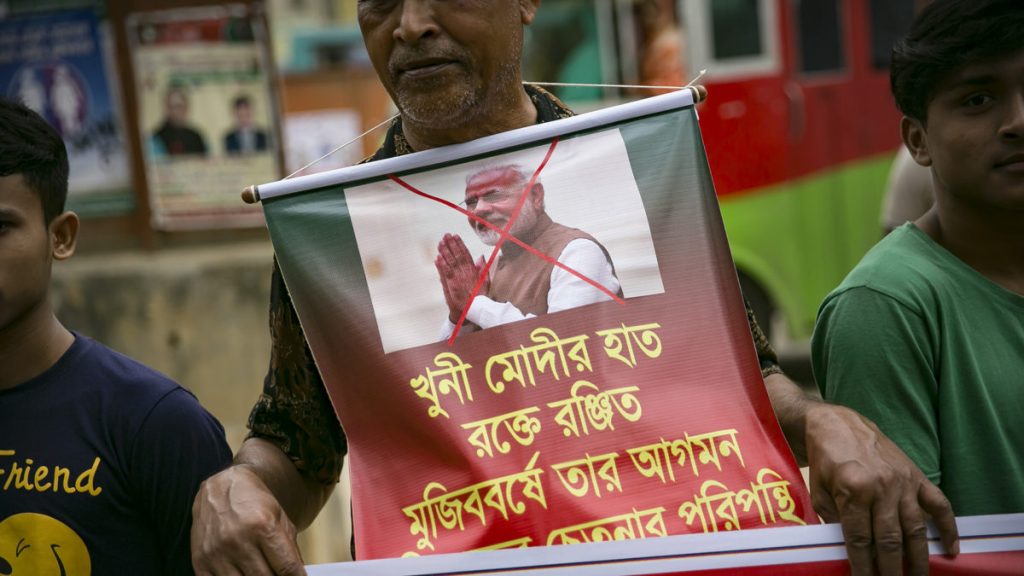KOLKATA, India — The Bangladesh police have arrested hundreds of members and supporters of a hard-line Islamist group over the past week after violent protests erupted against the visit of Indian Prime Minister Narendra Modi.
Modi’s visit to Dhaka, the capital of Bangladesh, was part of a two-day trip to celebrate the neighbor’s Independence Day. But Bangladesh’s 50th Independence celebration was marred by bloodshed after 13 protesters died during protests across several districts.
The demonstrators, led by the Islamist political party Hefazat-e-Islam Bangladesh, vandalized police stations, government buildings, and blocked highways.
Mamunul Haque, joint secretary of Hefazat-e-Islam Bangladesh, was arrested on April 18 after the Dhaka Metropolitan Police raided a seminar at a Dhaka madrasa (Islamic religious school).

“He [Haque] was arrested from Mohammadpur Jamia Rahmania Arabia Madrasa,” Iftekhairul Islam, Additional Deputy Commissioner of the Dhaka Metropolitan Police, told Zenger News.
“Haque is not in prison now. He is in police remand. The police are interrogating him.”
Islam said the police arrested 12 accused from Dhaka and the adjacent areas and confirmed that the crackdown on the group was over for now.
Haque, 47, is facing charges of instigating violence, but the Dhaka Metropolitan Police did not confirm whether the accusations were due to the protests against Modi’s visit.
“An investigation is being carried out against Haque,” Islam to Zenger News. “He is accused of several cases related to inciting violence in the community.”
The biggest crackdown took place in the eastern rural district of Brahmanbaria, where the police detained 340 members of Hefazat-e-Islam Bangladesh over the past week. This town witnessed most of the anti-Modi demonstrations.
“We arrested them after seeing video footage and identified them from those footages,” Mohammad Anisur Rahman, police superintendent of Brahmanbaria, told Zenger News.

“All of them have been transferred to the court, except six whose confessional statements haven’t been taken by the police authority.”
“The police arrested most of them from their homes,” he said. “Some others were arrested from hideouts. We came to know about their visit through spies and sources deployed across the country.”
Rahman says few accused are yet to be detained, and an investigation is going on.
Nurul Islam Jihadi, general secretary of Hefazat-e-Islam Bangladesh, told Zenger News that “28 of their prominent leaders have been illegally detained by the police”. He dismissed the charges against the party and called them “false allegations.”
Hefazat-e-Islam Bangladesh started in 2010 and is known to be the largest hard-line Islamist outfit in Bangladesh. It is mainly supported by students and teachers from Bangladesh’s Islamist religious schools.
After the fall of Jamaat-e-Islami, Hefazat-e-Islam Bangladesh gained prominence in the country.
The organization wants the Sheikh Hasina government to enact blasphemy laws, under which anyone found ridiculing or defaming Prophet Muhammad would be convicted and face the death penalty.
A similar law exists in Pakistan. Section 295C of the Pakistan Penal Code states that whoever “defiles the sacred name of the Holy Prophet Muhammad” shall be punished with death.
In 2013, demonstrations from Hefazat-e-Islam Bangladesh to enact blasphemy laws turned violent. In three months, the nation witnessed 150 people dying due to the violence, including 15 security forces. At least 2,000 people were injured.
“Some demonstrations were entirely peaceful; in others, protesters threw rocks at or otherwise attacked security forces. In a few cases, officers were beaten to death,” a Human Rights Watch report from the time states.
“In many cases, security forces responded to the violence appropriately, using non-lethal methods to disperse crowds. Yet, in many other cases, the police responded with excessive force, killing protesters and bystanders.”

In a speech to Bangladesh’s parliament earlier this month, Prime Minister Sheikh Hasina had warned the group leaders. She said they were playing with “fire”, and there might be “repercussions” if they resort to violence.
“We have seen a similar type of violence by this organization (Hefazat-e-Islam Bangladesh) since its inception,” Rezaur Rahman Lenin, a human rights consultant for the United Nation’s Resident Coordinator’s Office, told Zenger News.
The recent clashes have spotlighted the rising anti-India sentiments in Bangladesh despite Dhaka’s amicable bilateral relations with New Delhi.
“At least 500 people across the nation have been detained by the police authorities in the past week. Several members are actually involved in inciting violence in the community, but many are innocent civilians,” Lenin said.
“The police is using its power to detain the innocent as well,” he said.
“This mass crackdown is the repercussion of the violent protest that erupted during Modi’s visit. Few of the accused have been charged with cases relating to the 2013 violence as well.”
Lenin says the court is the best judge for the justification of these arrests.
“The warning from Shiekh Hasina was not the sole reason for the crackdown,” said Lenin.
“This organization was previously found to be linked with extremism. If all the detentions are made according to the law, then it is fine. But the question arises whether the police detained all of them according to the law.”
(Edited by Amrita Das and Gaurab Dasgupta. Map by Urvashi Makwana)
The post Bangladesh Police Detain Hundreds After Violent Protests Against Indian PM’s Visit appeared first on Zenger News.


